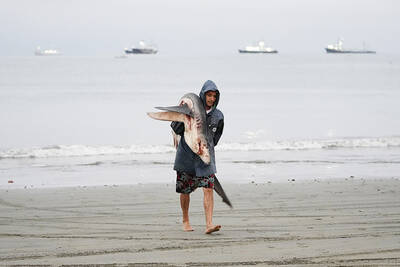When leaders gather this week in Los Angeles at the Summit of the Americas, the focus is likely to veer from common policy changes — migration, climate change and galloping inflation — and instead shift to something Hollywood thrives on: the drama of the red carpet.
With Mexican President Andres Manuel Lopez Obrador topping a list of leaders threatening to stay home to protest the US’ exclusion of authoritarian leaders from Cuba, Nicaragua and Venezuela, experts say the event could turn into a embarrassment for US President Joe Biden.
Even some progressive Democrats have criticized the administration for bowing to pressure from exiles in the swing state of Florida and barring communist Cuba, which attended the previous two summits.

Photo: Reuters
“The real question is why the Biden administration didn’t do its homework,” said Jorge Castaneda, a former Mexican minister of foreign affairs who now teaches at New York University.
While the Biden administration insists the president in Los Angeles would outline his vision for a “sustainable, resilient and equitable future” for the continent, Castaneda said it is clear from the last-minute wrangling over the guest list that Latin America is not a priority for the US president.
“This ambitious agenda, no one knows exactly what it is, other than a series of bromides,” he said.
The US is hosting the summit for the first time since its launch in 1994, in Miami, as part of an effort to galvanize support for a free-trade agreement stretching from Alaska to Patagonia, but that goal was abandoned more than 15 years ago amid a rise in leftist politics in the region.
With China’s influence expanding, most nations have come to expect — and need — less from Washington. As a result, the premier forum for regional cooperation has languished, at times turning into a stage for airing historical grievances, like when then-Venezuelan president Hugo Chavez at the 2009 summit in Trinidad and Tobago gave then-US president Barack Obama a copy of Eduardo Galeano’s classic tract The Open Veins of Latin America: Five Centuries of the Pillage of a Continent.
The US opening to former Cold War adversary Cuba, which was sealed with Obama’s handshake with then-Cuban president Raul Castro at the 2015 summit in Panama, lowered some of the ideological tensions.
“It’s a huge missed opportunity,” Ben Rhodes, who led the Cuba thaw as deputy national security adviser in the Obama administration, said on his Pod Save the World podcast. “We are isolating ourselves by taking that step because you’ve got Mexico, you’ve got Caribbean countries saying they’re not going to come — which is only going to make Cuba look stronger than us.”
To bolster turnout and avert a flop, Biden and US Vice President Kamala Harris have been working the telephones, speaking with the leaders of Argentina and Honduras, both of whom initially expressed support for Mexico’s proposed boycott.
Former US senator Christopher Dodd has also crisscrossed the region as a special adviser for the summit, in the process convincing Brazilian President Jair Bolsonaro, who was a staunch ally of former US president Donald Trump, but has not once spoken to Biden, to belatedly confirm his attendance.
Ironically, the decision to exclude Cuba, Nicaragua and Venezuela was not the whim of the US alone. The region’s governments in 2001, in Quebec City, declared that any break with democratic order is an “insurmountable obstacle” to future participation in the summit process.
The governments of Cuba, Nicaragua and Venezuela are not even active members of the Washington-based Organization of the American States, which organizes the summit.
“This should’ve been a talking point from the beginning,” said former US undersecretary of state for political affairs Tom Shannon, who in a long diplomatic career attended several summits. “It’s not a US imposition. It was consensual. If leaders want to change that, then we should have a conversation first.”
After the previous summit in Peru, in 2018, which Trump did not even bother to attend, many predicted there was no future for the regional gathering. In response to Trump’s historic pullout, only 17 of the region’s 35 heads of state attended.
“As long as we don’t speak with a single voice, no one is going to listen to us,” said former Chilean president Ricardo Lagos, who also faults Mexico and Brazil — the region’s two economic powers — for the current drift in relations. “With a cacophony of voices, it is much more difficult to find our place in the world.”
The election of Biden, who was Obama’s point man for Latin America and had decades of hands-on experience in the region from his time on the US Senate Foreign Relations Committee, set expectations for a relaunch, but as popular angst spread during the COVID-19 pandemic, the Biden administration was slow to match the vaccine diplomacy of Russia and China, although it did eventually provide 70 million doses to the Americas. Biden also maintained the Trump-era restrictions on migration, reinforcing the view that the US was neglecting its neighbors.
Since then, Biden’s hallmark policy in the region — a US$4 billion aid package to attack the root causes of migration in Central America — has stalled in the US Congress with no apparent effort to revive it. Russia’s invasion of Ukraine has also diverted attention away from the region.
Shannon said for the summit to be successful Biden should not try to lay out a grand US vision for the Americas, but rather show sensitivity to the region’s embrace of other global powers, concerns about gaping inequality and traditional mistrust of Washington.
“More than speeches, he will need to listen,” Shannon said.

WAKE-UP CALL: Firms in the private sector were not taking basic precautions, despite the cyberthreats from China and Russia, a US cybersecurity official said A ninth US telecom firm has been confirmed to have been hacked as part of a sprawling Chinese espionage campaign that gave officials in Beijing access to private texts and telephone conversations of an unknown number of Americans, a top White House official said on Friday. Officials from the administration of US President Joe Biden this month said that at least eight telecommunications companies, as well as dozens of nations, had been affected by the Chinese hacking blitz known as Salt Typhoon. US Deputy National Security Adviser for Cyber and Emerging Technologies Anne Neuberger on Friday told reporters that a ninth victim

Russia and Ukraine have exchanged prisoners of war in the latest such swap that saw the release of hundreds of captives and was brokered with the help of the United Arab Emirates (UAE), officials said on Monday. Ukrainian President Volodymyr Zelenskiy said that 189 Ukrainian prisoners, including military personnel, border guards and national guards — along with two civilians — were freed. He thanked the UAE for helping negotiate the exchange. The Russian Ministry of Defense said that 150 Russian troops were freed from captivity as part of the exchange in which each side released 150 people. The reason for the discrepancy in numbers

A shark attack off Egypt’s Red Sea coast killed a tourist and injured another, authorities said on Sunday, with an Italian Ministry of Foreign Affairs source identifying both as Italian nationals. “Two foreigners were attacked by a shark in the northern Marsa Alam area, which led to the injury of one and the death of the other,” the Egyptian Ministry of Environment said in a statement. A source at the Italian foreign ministry said that the man killed was a 48-year-old resident of Rome. The injured man was 69 years old. They were both taken to hospital in Port Ghalib, about 50km north

MISSING: Prosecutors urged the company to move workers out of poor living conditions to hotels, but residents said many workers had already left the town Brazil has stopped issuing temporary work visas for BYD, the Brazilian Ministry of Foreign Affairs said on Friday, in the wake of accusations that some workers at a site owned by the Chinese electric vehicle producer had been victims of human trafficking. The announcement came days after labor authorities said they found 163 Chinese workers who had been brought to Brazil irregularly in “slavery-like” conditions at the BYD factory construction site in the northeastern state of Bahia. The workers were employed by contractor Jinjiang Group, which has denied any wrongdoing. Later, the authorities also said the workers were victims of human trafficking,